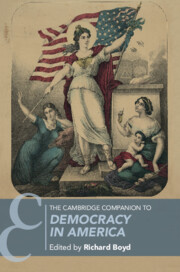Book contents
- The Cambridge Companion to Democracy in America
- Series page
- The Cambridge Companion to Democracy in America
- Copyright page
- Contents
- Contributors
- Acknowledgments
- Chronology
- Abbreviations of Tocqueville’s Major Works
- Introduction
- Part I Sources and Contexts
- 1 Tocqueville and the Philosophy of the Enlightenment
- 2 Tocqueville’s Dialogues
- 3 Fugitive Aristocracy: Tocqueville’s Search for Remnants of the Ancien Régime
- Part II Receptions and Applications
- Part III Genres and Themes
- Part IV Democracy’s Enduring Challenges
- References
- Index
- Series page
2 - Tocqueville’s Dialogues
from Part I - Sources and Contexts
Published online by Cambridge University Press: 23 March 2022
- The Cambridge Companion to Democracy in America
- Series page
- The Cambridge Companion to Democracy in America
- Copyright page
- Contents
- Contributors
- Acknowledgments
- Chronology
- Abbreviations of Tocqueville’s Major Works
- Introduction
- Part I Sources and Contexts
- 1 Tocqueville and the Philosophy of the Enlightenment
- 2 Tocqueville’s Dialogues
- 3 Fugitive Aristocracy: Tocqueville’s Search for Remnants of the Ancien Régime
- Part II Receptions and Applications
- Part III Genres and Themes
- Part IV Democracy’s Enduring Challenges
- References
- Index
- Series page
Summary
In this chapter, Aurelian Craiutu documents key elements of Tocqueville’s political thought that are either anticipated or shared by the so-called Generation of 1820. Like Tocqueville, this cohort came of age in France during the time of the Bourbon Restoration. It included figures such as Théodore Jouffroy, Charles de Rémusat, Félicité Robert de Lamennais, and others who struggled like Tocqueville to make sense of the dawning tide of democratic equality. Their writings also reckon with problems of individualism, skepticism, and the loss of authority that all regarded as characteristic of the democratic age. Most importantly, however, Craiutu suggests in this chapter that many of Tocqueville’s insights – including his interest in the United States – may be explained by the influence of his kinsman François-René de Chateaubriand, whose earlier visit to America and subsequent writings shared much with Tocqueville’s vision.
Keywords
- Type
- Chapter
- Information
- The Cambridge Companion to Democracy in America , pp. 69 - 99Publisher: Cambridge University PressPrint publication year: 2022

